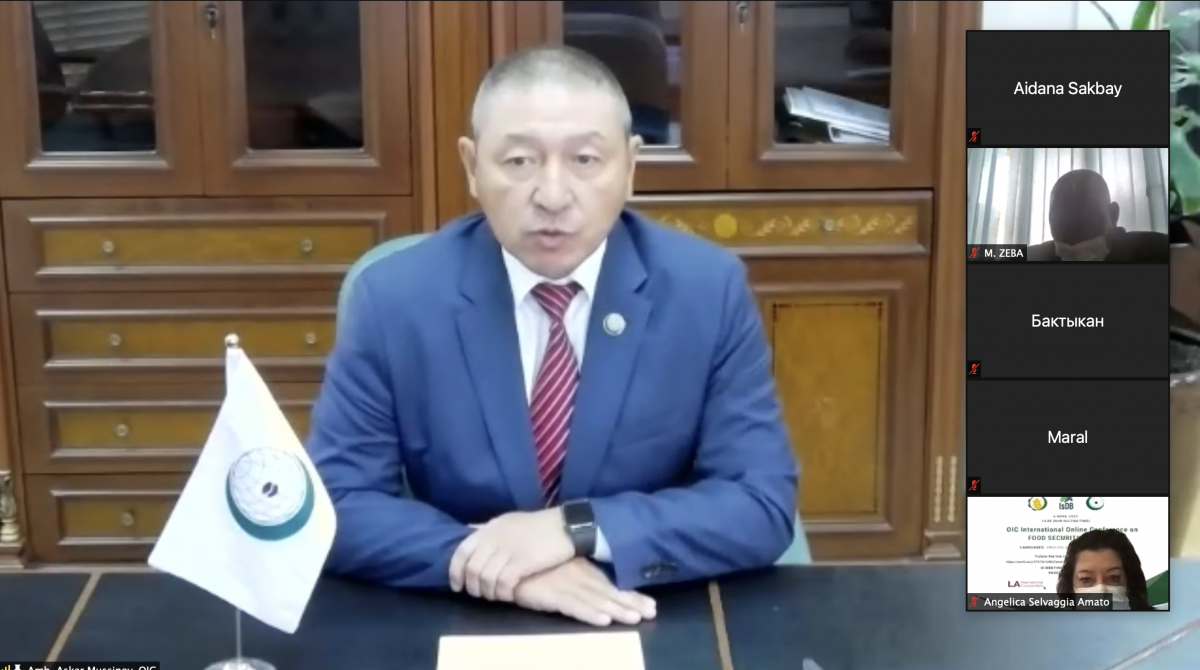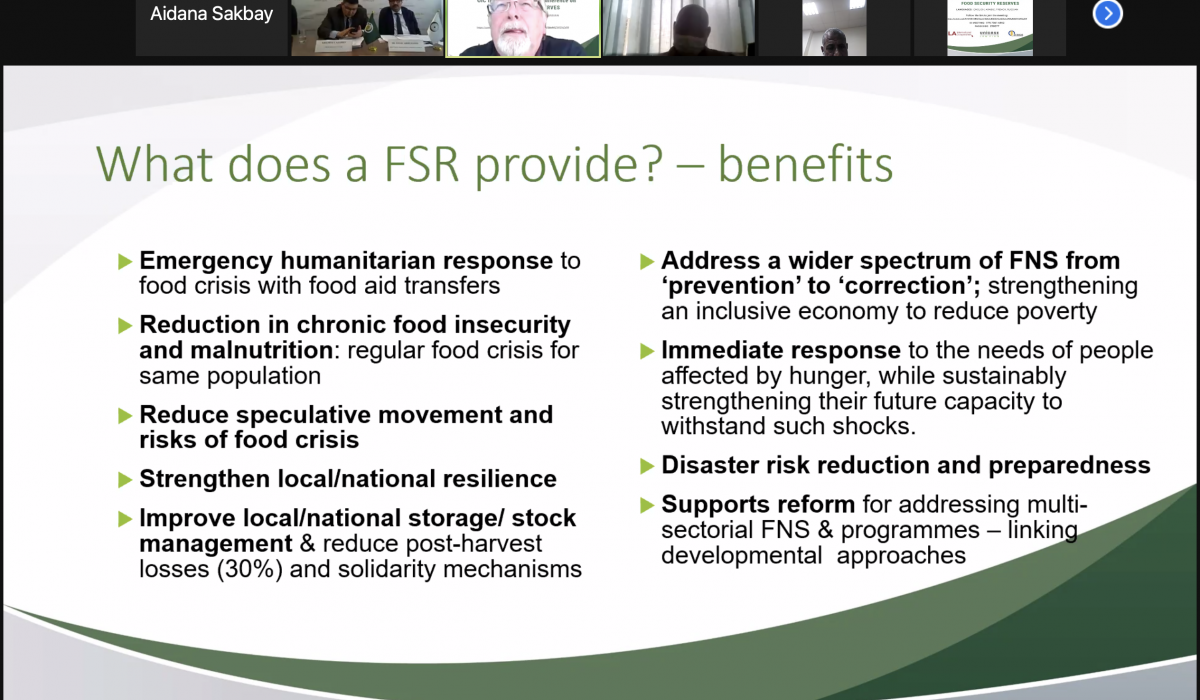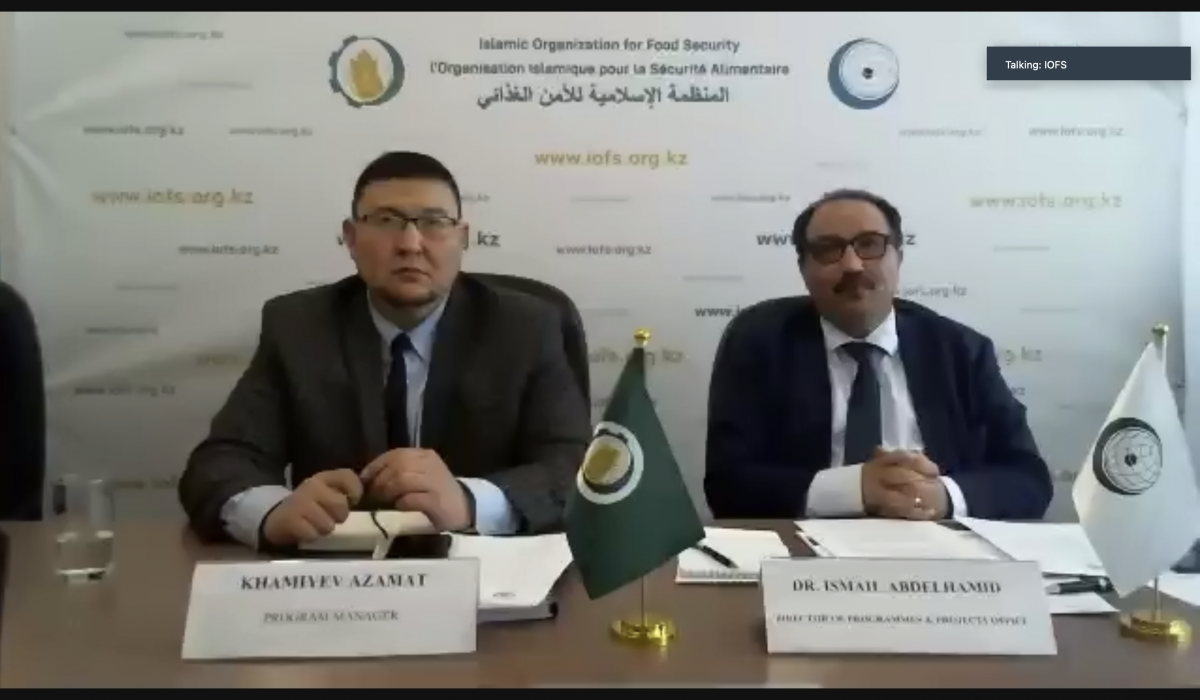On April 6, 2021, the Islamic Organization for Food Security organized the “OIC International Online Conference on Food Security Reserves” to explore the role of the reserves in alleviation of food insecurity in the member states and discuss the pre-feasibility study, concepts, and proposals for their establishment.
The conference was started by H. E. Ambassador Askar Musinov, Assistant to the Secretary General of OIC General Secretariat for Science and Technology; in his speech, he spoke of the importance of the OIC Food Security Reserves in the fight against food insecurity crises in the member states. He emphasised the strong support the OIC provides for IOFS in its efforts to ensure food security through the strategic programs. 
In his opening speech, H.E. Mr. Yerlan A. Baidaulet, Director-General of IOFS noted that the necessity of establishing the OIC Food Security Reserves has long been highlighted by OIC the member states since 1995. First it was mentioned during the 4th OIC Ministerial Conference on Food Security and Agricultural Development in Tehran, Islamic Republic of Iran, and then at the 7th OIC Ministerial Conference in Nur-Sultan, Kazakhstan in 2016. He stated that creating region-wise food security reserves would be the most concrete way to assure food security in case of humanitarian disaster.
According to the FAO reports, around 2 billion people worldwide experience moderate to severe food insecurity, many of them reside in the OIC member states. The pandemic has exacerbated the situation; in accordance with WFP and Global Humanitarian Overview (GHO) 2021, there’s a near-40 percent increase of demand for humanitarian assistance and protection in 2021 due to COVID-19.
The establishment of Food Security Reserves could consolidate efforts of the OIC/IOFS Member States towards achieving food security and eliminating hunger across the Muslim world. After the adoption of the Resolution № IOFS/GA/3-6-2020 on the Establishment of the OIC Food Security Reserves at the Third General Assembly on 2-3 December 2020, the IOFS Secretariat was tasked to engage experts in enhancement of the preliminary studies and gather the member states to approve the further development of the Food Security Reserves
The activities of the IOFS are aimed at solving the problem of food insecurity in the Member States through 16 strategic programs approved at the 3rd IOFS General Assembly held in Turkey in December 2020. These IOFS programs, in general, are focused on three main tasks: first, prevention and risk management in the field of food security, that include establishing the OIC Food Security Reserves. Second, capacity building in agriculture through strengthening trade and economic ties and scientific and technological potential, and third, providing humanitarian support to the OIC countries in need
H.E. Yerlan Baidaulet, Director-General of IOFS expressed hope “that the outcome of OIC Food Security Reserves Conference would lead to creating a credible mechanism for cooperation among OIC member states towards ensuring food security through the efforts of each country.”
The first session was led by Mr. Stephen Catchpole, the Public Sector Reform Specialist at LA International Cooperation, the IOFS partner. He outlined the overall purpose of the FSR, that is, to facilitate the population access to food during the periods of food shortage in the OIC Member States through coordination of national food stock policies and national food reserves. This requires the member states to conclude bilateral and multilateral agreements to eliminate barriers against international trade, to have access to stock and distribution measures in the event of crisis, as well as to protect food stock and ensure market price stability.
The next session was delivered by Mr. Pierre Van Roosbroeck, International Consultant in Food Security, who presented the concepts of food security and a draft preliminary feasibility study of the IOFS Food Security Reserves. The session elaborated on many aspects of the FSR management, including technical, design, financial, geographical and logistical.
Furthermore, Mr. Stephen Catchpole provided an overview of the draft Memorandum of Understanding of the FSR, that covered its strategies, management mechanisms, distribution and exchange policies, role of the FSR Steering Committee and Secretariat, and others.
Following the presentations, the participants provided their feedback and recommendations upon further improvement of the studies presented.
The Conference demonstrated the relevance and necessity of the FSR. Therefore, the next milestone in achieving this ambitious goal will be solving the tasks of creating a Steering Committee and conduct appropriate meetings for each potential regional food reserve, and finally, developing separate, full-fledged feasibility studies for each food security reserve.







